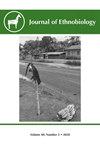爱维持生命:Jkyojkwainï和关爱地球的同盟策略
IF 1.3
3区 社会学
Q1 ANTHROPOLOGY
引用次数: 5
摘要
摘要这篇文章是一篇饱含激情的墓志铭,传达了最近去世的委内瑞拉亚马逊地区的Jotï智者们的教诲。这是为了纪念他们希望传播jkyo jkwainï哲学的愿望,该哲学认为,关爱我们周围的每个人和每件事是人类的基本特征,是维持所有生命的关键。如果这种天生的能力得到培养,它就会赋予人们维持甚至改善生活世界的能力;如果被压制,它的缺失将不可避免地导致世界的退化和灭亡。他们的基本信息敦促每个人利用我们内心已经存在的爱的活力来扭转自私地利用自然的主导趋势。关爱的环境伦理实际上可以在不同的文化传统中找到,无论是土著文化还是非土著文化。(重新)建立关爱作为组织人类生态动态的中心指导原则已经在全球不同的城市和农村环境中发生。强调古代生态哲学和当代生态社会运动之间的重要联系,以表明建设生态乌托邦向前发展的真实可能性。这些论点与种族生物学家、土著权利倡导者和环境活动家支持的生物文化保护的假设相一致。提到案例研究是为了强调各种各样的利益相关者所共有的共同点。本文章由计算机程序翻译,如有差异,请以英文原文为准。
Love Sustains Life: Jkyo jkwainï and Allied Strategies in Caring for the Earth
Abstract. This essay is an impassioned epitaph conveying the teachings of Jotï wise persons from the Venezuelan Amazon who passed away recently. It honors their wish to spread the philosophy of jkyo jkwainï, which holds that loving-caring for everyone and everything around us is an essential human trait that holds the key to sustaining all life. If this innate faculty is nurtured, it gives people the power to maintain or even enhance the living world; if suppressed, its absence will inevitably lead to the degeneration and demise of the world. Their essential message urges everyone to use the dynamism of love already present within us to reverse the dominant trend of exploiting nature selfishly. An environmental ethic of loving-caring can actually be found in disparate cultural traditions, both Indigenous and non-Indigenous. (Re)establishing loving-caring as a central guiding principle for organizing human ecological dynamics is already taking place in different urban and rural settings globally. Vital connections between ancient eco-philosophies and contemporary ecosocial movements are highlighted in order to show that real possibilities exist for building ecotopias moving forward. These arguments are attuned to postulates for biocultural conservation endorsed by ethnobiologists, Indigenous rights advocates, and environmental activists. Case studies are mentioned to stress the common ground shared by a diverse assortment of stakeholders.
求助全文
通过发布文献求助,成功后即可免费获取论文全文。
去求助
来源期刊

Journal of Ethnobiology
Social Sciences-Anthropology
CiteScore
4.80
自引率
3.40%
发文量
21
审稿时长
>12 weeks
期刊介绍:
JoE’s readership is as wide and diverse as ethnobiology itself, with readers spanning from both the natural and social sciences. Not surprisingly, a glance at the papers published in the Journal reveals the depth and breadth of topics, extending from studies in archaeology and the origins of agriculture, to folk classification systems, to food composition, plants, birds, mammals, fungi and everything in between.
Research areas published in JoE include but are not limited to neo- and paleo-ethnobiology, zooarchaeology, ethnobotany, ethnozoology, ethnopharmacology, ethnoecology, linguistic ethnobiology, human paleoecology, and many other related fields of study within anthropology and biology, such as taxonomy, conservation biology, ethnography, political ecology, and cognitive and cultural anthropology.
JoE does not limit itself to a single perspective, approach or discipline, but seeks to represent the full spectrum and wide diversity of the field of ethnobiology, including cognitive, symbolic, linguistic, ecological, and economic aspects of human interactions with our living world. Articles that significantly advance ethnobiological theory and/or methodology are particularly welcome, as well as studies bridging across disciplines and knowledge systems. JoE does not publish uncontextualized data such as species lists; appropriate submissions must elaborate on the ethnobiological context of findings.
 求助内容:
求助内容: 应助结果提醒方式:
应助结果提醒方式:


